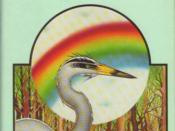Fear and its Effects and Functions in "The Ones Who Walk Away from Omelas"
Fear plays a very important role in Ursula K. Le Guin's short story "The Ones Who Walk Away from Omelas" as it pertains to the story's main theme of the collective's needs and wants being more important than that of an individual. Fear helps to develop the plot as well in that it functions as hidden ripple in the perfection of Omelas because how can a person or group of persons be perfect when they still fear things. It also plays a key role in helping to develop the story's sub themes of the importance of preserving paradise and how easy it is to dehumanize someone when it is beneficial to yourself as well as the need to dehumanize the child in order to succeed in the child's isolation without opposition from citizens.
With relation to the story's central theme of the collective's needs and wants being more important than that of an individual, fear functions as a constant reason not to doubt tradition. The people who live in Omelas are living in a seemingly utopian society with gay festivals free of civil strife or unhappiness. Yet as Le Guin delves deeper into the story of the little town of Omelas a small child is discovered that is supposedly responsible for all the happiness in the town. Through depriving the child of all but the bare necessities of life the tranquil towns flourishes. Somehow the people of Omelas believe that keeping this child isolated from society and in perpetual suffering keeps the town in its entire utopian splendour. Fear functions as the reason that people do not help the child. The fear of losing their perfect world is much too great...


